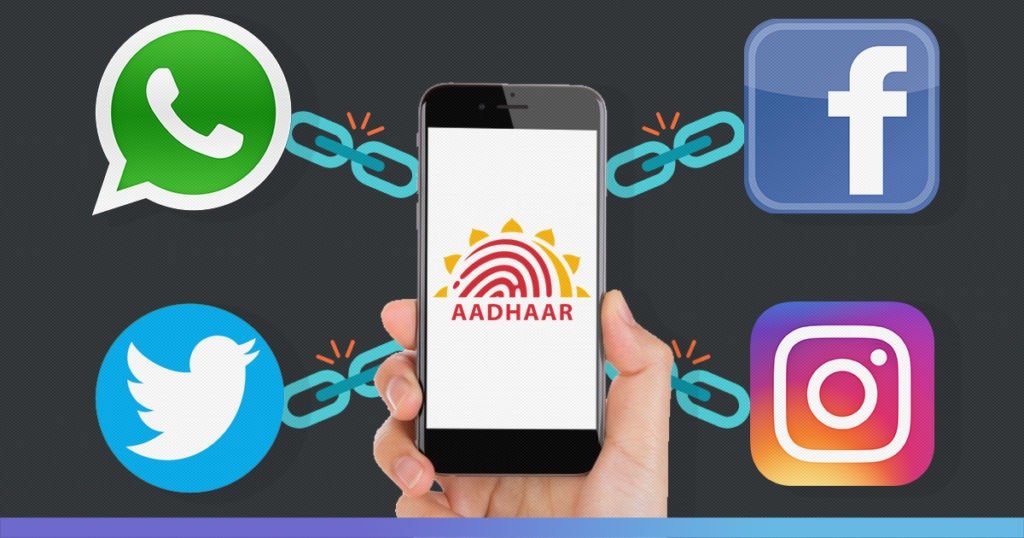Ever since “Privacy” has been declared a fundamental right, after a Supreme Court Landmark Judgement in 2017, this will be the first big conflict on Right to Privacy. The need to link Aadhaar with the social media account of the stakeholders arose to keep a check on the spread of fake news, pornographic material and anti national content among the few to name was proposed by the Tamil Nadu Government. Facebook , however, resented to such a move as it would hinder the privacy of the users. The Government actively referred it to the “ Blue Whale Game Challenge”, which has reportedly claimed hundreds of death. Even the originator of such a menace was hard to trace. This is an infringement of the right of the individual.
Introduction: SC Dismisses Plea Seeking Social Media-Aadhaar Linkage To Remove ‘Fake’ Accounts To Curb ‘Fake News’ :
The Supreme court on August 20, 2019 directed on the need to strike a balance between the right to privacy over online data and the right of the state to trace the origin of hate messages or fake news that could create panic situation. Even the Madras High Court on August 21, 2019 dismissed the original prayer to link Aadhaar as it violated SC Judgement.
Significance of this development:
This linking of Aadhaar with the social media would have helped to check the form of fake news, its origin, how hate messages are spread as well as other illegal content. Once the individual online identity is linked to the actual identity of the users, such spreading of fake news would have diminished to a certain extent. It will be easy to trace the social media instigators and the defamators by keeping a record of each message alongwith the registered mobile number or email address which in turn will also lead to end of private communications.
Arguments made in the plea:
Facebook expressed its view that it cannot share the 12- digit Aadhaar number with a third party as the content on its instant messaging Whatsapp was end-to-end encrypted and even they do not have access such information. It further contended that there are four petitions including two in Madras High Court, one in Bombay High Court and one in Madhya Pradesh High Courts and they contained almost similar prayers. Facebook’s plea was to transfer all this petition to Supreme Court. The Supreme Court agreed to hear a plea by Facebook to transfer to the apex court four petitions filed in the High Courts of Madras, Bombay and Madhya Pradesh seeking the linking of Aadhaar database to social media platforms.
Reasoning behind observation of SC:
The Supreme court bench comprising of J. Deepak Gupta and J. Aniruddha Ghosh gave a light over the misuse of the dark web world. The bench response came after the submissions made by the Tamil Nadu Government focusing on the need of linking Aadhaar database with social media. Both Facebook and Whatsapp resented to such an approach, Whatsapp though worst affected as it was a private space to converse online with having end-to-end encryption.
Critical analysis:
There are pros and cons to every side. It will help to curb terrorism by providing safety and security. It will help to trace the origin of online content. It will help to take preventive actions before harm is caused. On the other side it will be an infringement of right to privacy under Article 21. Linking Aadhaar to social media is a threat to democracy in a way that it can be used to influence the election procedure and the voting behaviour of the individuals through surveillance which in turn will pose a serious threat to people’s power and freedom. It will also act as a financial threat to security of individual’s bank related information. The government’s surveillance may not be always about increasing the security of the people. It can be used in the sense to avoid transparency, leading to the loss of basic human rights. Decisions regarding surveillance activities are taken by the executive branch (including the review process), with no parliamentary or judicial supervision of the government.
Conclusion:
As a country we should concentrate on developing our research technology for development and to save our virtual environment rather not open our data for misuse. Proper awareness should be made among users to stop the propagation of fake news and verify the news once before spreading it to others from authentic sources. An educated customer in the future will act as an antidote to fake news. It will jeopardize the independency and the democratic rights of an individual because no one knows how the data will be misused by the companies or the government itself.
The Supreme Court stressed the need to find a appropriate balance between the right to online privacy and the right of the State to detect people who use the web to spread panic among the people and commit crimes. But finding such a balance is not only difficult but almost impossible without adequate technology.
Image from https://thelogicalindian.com/news/aadhar-card-linkage-social-media-account/


